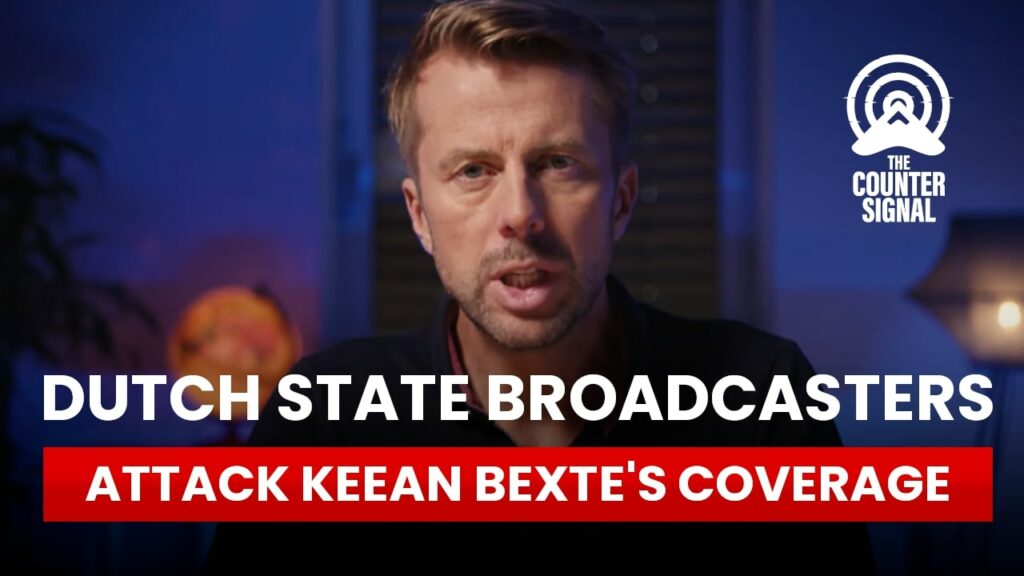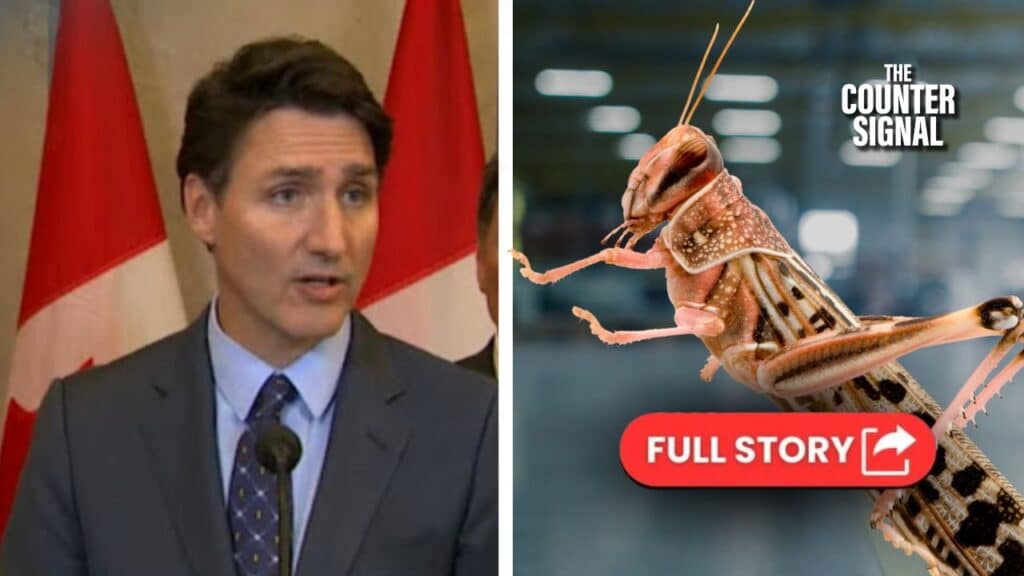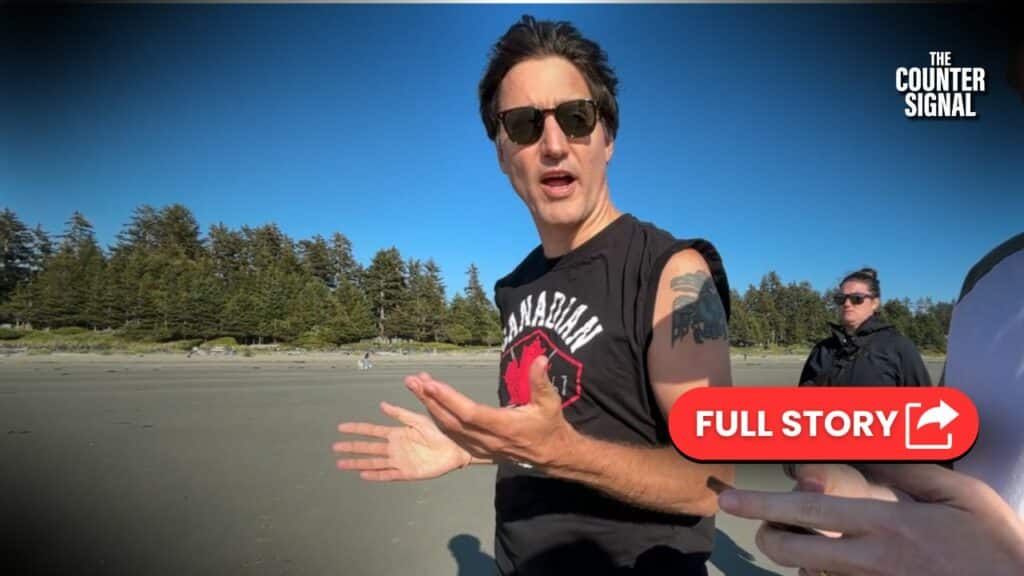Dutch state broadcasters have come out swinging on behalf of the WEF and are attacking TCS Editor-in-Chief Keean Bexte’s coverage of the Dutch Uprising.

In a video entitled “The Great Reset: the recurring fabrications,” Nieuwsuur, a program produced by government broadcasters, claims that Bexte travelled to the Netherlands to perpetuate supposed conspiracy theories, saying that the WEF has “absolutely nothing” to do with the “nitrogen crisis” — by which they mean the nitrogen policy to cut emissions by 50% and destroy farmers’ livelihoods.
“These bloggers from far-right websites have travelled to the Netherlands especially to see that image confirmed,” the host says before playing a clip of Bexte talking about the WEF’s support for the career-destroying nitrogen policy being protested.
“But the WEF has absolutely nothing to do with the nitrogen crisis,” he continues. “It was the highest judge who ordered the Netherlands to comply with the nitrogen standards of the European Union.”
Yes, but where did the “nitrogen standards” of the European Union come from?
The nitrogen policy that was introduced is just one of many policies being brought forth by the EU to better align with the UN’s radical Sustainable Development Goals to cut all emissions, which is itself part of the UN’s Agenda 2030.
According to the European Commission’s website, “Sustainable development is a core principle of the Treaty on European Union and a priority objective for the Union’s internal and external policies. The United Nations 2030 Agenda includes 17 Sustainable Development Goals (SDGs) intended to apply universally to all countries.”
Moreover, in an EU briefing entitled “European policies on climate and energy towards 2020, 2030 and 2050,” the European Parliament states the UN’s Sustainable Development Goals will impact European policy, specifically regarding climate policy:
Within the framework of the commitments laid down in the Paris Agreement, in November 2018, the European Commission published a new long-term strategy which confirms Europe’s commitment to lead on global climate action and to achieving net-zero GHG emissions by 2050, through a socially fair transition in a cost-efficient manner… The strategy does not intend to launch new policies, nor does the European Commission intend to revise the 2030 targets. It is rather meant to set the direction of transition of EU climate and energy policy, and to frame what the EU considers as its long-term contribution to achieving the Paris Agreement temperature objectives, in line with the UN Sustainable Development Goals, which will further affect a wider set of EU policies.
Now, who has been a core contributor in shaping the UN’s Sustainable Development Goals? Why, the World Economic Forum, of course.
In 2019, the WEF and UN signed a strategic partnership “to accelerate the implementation of the 2030 Agenda for Sustainable Development.”
“The new Strategic Partnership Framework between the United Nations and the World Economic Forum has great potential to advance our efforts on key global challenges and opportunities, from climate change, health and education to gender equality, digital cooperation and financing for sustainable development,” said UN Secretary-General António Guterres at the time.
So, yes. If the Netherlands is abiding by the EU’s climate policies, and the EU’s climate policies are based on the UN’s Sustainable Development Goals, and the WEF signed a partnership with the UN to control what these goals are, I think it’s safe to say that the WEF absolutely has something to do with the nitrogen policy being protested right now.
This should be obvious, as founder Klaus Schwab’s whole Great Reset book (which the host says he read) is all about utilizing the COVID pandemic to get countries to achieve the 2030 Agenda on time.
The WEF has even gone so far as to create a virtual reality world to promote SDGs.
Besides licking Schwab’s boots, Nieuwsuur also goes after legal philosopher Eva Vlaardingerbroek and Dutch politicians opposed to the WEF, specifically Thierry Baudet, the leader of the Forum for Democracy, lamenting the popularity of Baudet’s critical posts regarding the Great Reset.
The host also admits that Klaus Schwab didn’t have enough time to do an interview with him to talk about the Great Reset (embarrassing) before continuing to defend the World Economic Forum. He claims that everything negative that people say about the WEF is “sheer nonsense.”
Funnily enough, speaking at the WEF in 2020, Dutch PM Mark Rutte advised that governments and businesses around the world should start paying off journalists to control the narrative and bring the people honest coverage. It appears we are seeing the fruits of this initiative.
“You need the free press at these moments to be able to explain to the people what is really happening. But that costs money,” Rutte explains. “So, one of the pleas I have with big business here in Davos [is] don’t put all your money in the internet advertising. Make sure that our newspapers, our news outlets — also our TV stations — also in the future will be able to pay sensible and real salaries to our journalists to be able to do this.”
The globalists, of course, applauded the plea for more corruption, which the Dutch are now dealing with right now.
Mark Rutte, Prime Minister of the Netherlands in 2020 at the World Economic Forum suggests paying for the salaries of journalists to inform the Dutch on issues like Climate Change.
— K2 (@kiansimone44) July 6, 2022
Where is the Dutch media during the farmer protests? pic.twitter.com/KrNK9FNqFr










